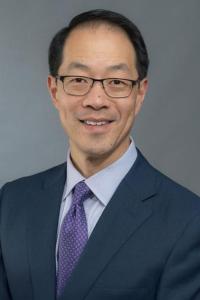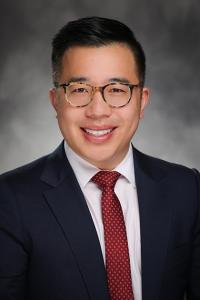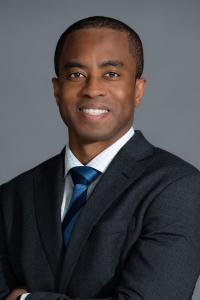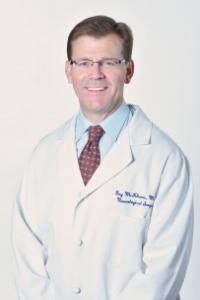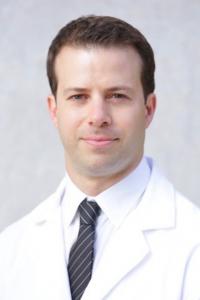AANS 2025: Columbia Neurosurgery's Ripple Effect
A Network of Mentors, Innovators and Life-Long Learners
The recent American Association of Neurological Surgeons (AANS) Annual Meeting in Boston was themed, "Power of One, Impact of Many." Dr. E. Sander Connolly shared, “this highlights the ripple effects we create as leaders, physicians and scientists.” Dr. Connolly served as this year’s President-Elect and will be serving in 2026 as AANS President at the Annual Meeting in San Antonio, Texas. Dr. Connolly reflected, "I'm thrilled to serve as President at next year's meeting and lead this organization as a formidable force within our field to innovate, connect and most importantly, elevate and improve patient care."
Epilepsy and Movement Disorders
Dr. Guy McKhann served as moderator for "Minimally Invasive Lesioning Techniques for Brain Tumors and Epilepsy," where the team discussed novel technologies including laser thermal therapy (LITT), radiofrequency ablation (RFA), and focused ultrasound (FUS). Says Dr. McKhann of this enthusiastically attended Practical Clinic: “These technologies represent both the present and future of our efforts to treat patients less invasively and more safely.”
Dr. Brett Youngerman was a presenting author for Neuromodulation for Novel Indications, where he discussed A Modular Brain-Computer Interface System of Wireless, Fully Implanted, Mechanically Flexible, High-Channel-Count Subdural and Depth Brain Electrode Arrays. Of his latest findings, Dr. Youngerman says, “This new system is unique in that it can record and stimulate broad networks in the brain for conditions such as epilepsy and neuropsychiatric disorders, as well as interface with the brain at very high resolution to support motor and speech neuroprosthesis. In this presentation, we demonstrated that the device works in preclinical models. Our next step is to pursue FDA approval for human studies.”
Dr. Youngerman also chaired the Young Neurosurgeons Section of the Council of State Neurosurgical Societies, which advocates for surgeons and patients on socioeconomic issues to ensure continued availability of high quality neurosurgical care.
Spine
Dr. Dean Chou was a featured speaker at Minimally Invasive Spinal Surgery: Comprehensive and Practical Review of Contemporary Approaches and Techniques, where he shared cases focused on MIS Corpectomy +/- Percutaneous Fixation. Says Dr. Chou, "The spine rooms were standing room only, with tremendous attendance."
Dr. Andrew Chan also presented in this section a talk called "Deformity Case Presentation (Lumbar moderate kyphoscoliosis)." Dr. Chan remarked, “it was fun sharing my MIS deformity cases with the session audience and hearing other surgeons debate how they would have treated the case.”
Dr. Chou also served as a moderator for "Surgical Mishaps.” Dr. Chou shared, "Feedback from the AANS participants was that seeing how complications were managed was much more useful than seeing perfect, esoteric surgeries. The participants really appreciated seeing complication management."
Dr. Chan also served as moderator for “Cervical Spine Debates,” where several controversial topics were debated (e.g., how to treat a C2 fracture, how to approach ossification of the posterior longitudinal ligament (OPLL). To a packed audience with standing-room only, Dr. Chan debated for going with an anterior approach for OPLL against Dr. Michael Wang from University of Miami.
Dr. Chan also presented in the session The Quality Outcomes Database—What Surgery Really Works? (Insights From Long Term Follow-up), where he discussed "Do You Have to Reduce a Lumbar Spondylolisthesis to Get the Best Outcome?" Dr Chan commented, "This was an excellent session—with talks all powered by studies resulting from the QOD Spine CORe research team. It was a perfect showcase of the clinically impactful work coming out of the Spine CORe, the NeuroPoint Alliance, and AANS.
The Columbia Neurosurgery team works in collaboration with the QOD Spine registries which serve as a continuous national clinical registry for the most common neurosurgical and spine procedures and provides individual surgeons, practice groups, hospitals, and healthcare systems with an immediate infrastructure for analyzing and reporting on the quality of their care. The QOD Spine registries include Lumbar Spine, Cervical Spine, and Spinal Deformity.
Neurosurgical resident, Dr. Deborah Boyett, was awarded the AANS Veena Mummaneni Award, which acknowledges the research of an outstanding young female neurosurgeon. In her plenary presentation, she presented work with Dr. Chan, Dr. Chou, and the QOD Spine CORe team investigating the impact of back pain catastrophizing on outcomes after surgery for grade 1 degenerative lumbar spondylolisthesis
Says Dr. Boyett,, "It was truly an honor to represent Columbia Neurosurgery at AANS this year, and I want to extend my sincere thanks to Dr. Andrew Chan for this opportunity and his incredible mentorship. Our research provides critical insights to guide neurosurgeons as they counsel patients suffering from severe back pain, and it's deeply fulfilling to be a part of this fantastic research team and these advancements in patient care."
Finally, our medical student, Chiemela Izima, served as a presenting author for "Impact of Irritable Bowel Syndrome on Surgical Complexity and Perioperative Parameters in Elective Spinal Fusion." Of the findings, Chiemela reflected, "that patients with irritable bowel syndrome/functional gastrointestinal disorders are more likely to receive extensive lumbosacral fusion, contributing to increased readmissions within 90 days after surgery."
Facial Pain and Surgery
Columbia Medical Student, Colby Joncas, who works closely with Dr. Raymond Sekula on research projects in his role as a Dean's Research Fellow, served as a presenting author for a study entitled "Glycerol Versus Open Partial Rhizotomy in the Management of Trigeminal Neuralgia Secondary to Multiple Sclerosis," highlighting the durability of pain relief following partial sensory rhizotomy relative to percutaneous glycerol rhizolysis of the trigeminal ganglion in this patient population. Says Colby of this recent project, "Our patients often suffer unrelenting pain from TN attributed to MS, and this project is a small step towards determining how we can best alleviate this debilitating pain."
Neuro-Oncology
Dr. Brian Gill moderated a very interesting brain tumor session on Saturday, "Advances in Care Beyond the Scalpel," where he showcased some of the latest research and treatment options for brain tumor. Dr. Gill shared, "This session focused on the utility of surgical and non-surgical adjuncts to improve the quantity and quality of life for patients with brain tumors and featured a variety of exciting topics including liquid biopsy, cancer neuroscience, AR/VR in the neurosurgical OR and modern approaches to brain mapping. Excitingly many of these research endeavors are also on going at CUIMC."
Columbia Medical Student Nathaniel Rolfe was a presenting author on "Characterizing the Myeloid Microenvironment in IDH-Mutant Gliomas," where he showed that a distinct myeloid RNA expression profile in IDH-mutant gliomas correlates with patient survival. His work further showed that increased MSR1 expression in high-grade IDH-mutant tumors suggests increased recruitment of bone marrow-derived macrophages to the tumor microenvironment.
Finally, Columbia Medical Student Nicholas DeWalt presented his paper, "Brainstem morphological changes following safe convection-enhanced delivery of panobinostat in diffuse midline glioma," which illustrates the brainstem’s elastic capacity to safely accommodate and recover from convection-enhanced delivery, supporting its feasibility for treating diffuse midline glioma.”
AANS and Social Media
Resident Dr. Nathan Shlobin (PGY-1) was announced as the AANS 2025-26 Social Media Director for the Journal of Neurosurgery, the official journal of the AANS and a 2025 AANS Social Media Ambassador. Regarding the Journal of Neurosurgery, Dr. Shlobin shares, "I am excited to become the new Social Media Director for the Journal of Neurosurgery after being part of the social media team for the last five years. I hope to continue the team's excellent work in publicizing groundbreaking research and fostering discussion among the neurosurgical community."
Dr. Shlobin further commented, "It is a privilege to serve as a 2025 AANS Social Media Ambassador along many distinguished colleagues. We aim to highlight all of the practice-changing, interesting, and exciting developments in the field throughout the conference."
In summary, the team had a great time in Boston, connecting with alumni and friends across the field. We were honored to have another opportunity to come together with other world leaders in neurosurgery to share our knowledge and best practices.
We look forward to seeing you in 2026 in San Antonio.







